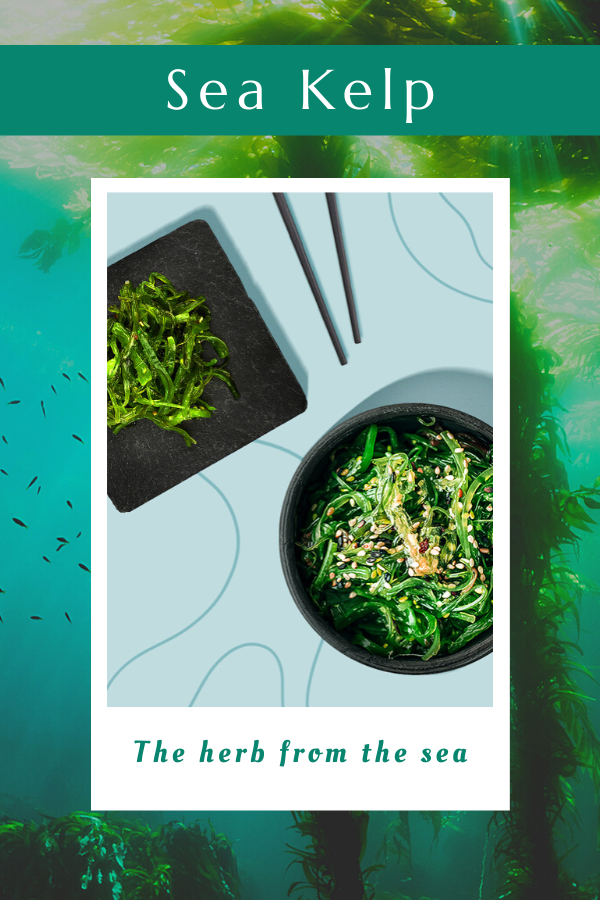
Kelp, also known as brown algae, is a type of brown seaweed that lives in the ocean and can grow to enormous sizes.
Eaten and used medicinally for hundreds of years in various forms, kelp is processed today and combined with by-products to be used in some ice creams, salad dressings and even chocolate milk! It is a common ingredient in Asian cuisine and has become a popular dietary supplement, mostly due to its high iodine content.
Iodine is a necessary mineral in our bodies, yet an estimated 2 million people battle iodine deficiency. Being that it is a natural source of iodine, kelp is considered safer and better for the body than any other synthetic source.
Find out the benefits of iodine and how kelp can help below!
Benefits of a diet rich in iodine:
- Iodine is a natural energy booster. There has been found to be a clear relationship between energy levels and iodine intake.
- Iodine functions to calm the body and relieve nervous energy or anxiety, thus reducing irritability and enabling better sleep.
- Studies have shown that the brain functions better and thinking is clearer when the body is provided with the correct amount of iodine.
- Iodine is known to have beneficial effects on the heart and circulatory system.
Eating foods that are rich in iodine is important in our daily diets. You can find iodine in fish, radishes, carrots, spinach, rhubarbs, strawberries, cabbage and onions.
Still, not everyone eats a sufficient amount of these foods to positively impact iodine levels. This is where kelp comes in!
Benefits of Kelp

Excellent source of vitamins and minerals: Everyone today is low in minerals due to modern agricultural methods, depleted soils, food processing, and even weak digestion.
Kelp contains 46 minerals, 16 amino acids (the building blocks of protein) and 11 different vitamins. Prominent minerals include iodine, salt, iron, potassium, phosphorus and calcium.
The prominent vitamins are vitamin A and niacin.
Helps in thyroid regulation: The high levels of iodine in kelp help to regulate the thyroid hormones in the body, therefore regulating our metabolism and energy levels.
It is estimated that 15 percent of women have moderate to severe iodine deficiency, many of whom are completely unaware.
The high iodine content in kelp can help to reverse hypothyroidism and promote the body’s production of thyroid hormones.
Helps with weight management: Because of kelp’s iodine content and its role in thyroid health, one of kelp’s benefits includes increasing metabolism and energy.
An iodine deficiency can slow your metabolic function by as much as 50 percect, so keeping your iodine levels at a healthy level can significantly improve weight management.
Improves pH levels: Kelp is an alkaline food, which means that it is an essential part of maintaining acid balance in the body.
This makes it an effective component to a healthy acid-alkaline diet.
May fight off cancers: Recent studies have shown that people who consume an Asian diet have a lower incidence of hormone-dependent cancers, such as breast and ovarian cancer.
Kelp contains fucoidan, which studies have shown cause cell death in cancer cells. It is also interesting to note that Japanese women, whose diets are high in kelp, have the lowest rates of breast, ovarian and endometrial cancer in the world.
Kelp also has the following beneficial properties: anti-oxidant, anti-inflammatory, anti-cancer, and anti-viral.
How to Use Sea Kelp:
Kelp can be consumed in different forms.
- Use kelp granules as a salt substitute. Just add it to salads, seafood, sausages or soups.
- Use powder form as a final seasoning.
- Take it as a nutritional supplement in tablet form.
The right brand of kelp is an extremely beneficial supplement for nearly everyone. It is inexpensive, widely available, safe and beneficial.
Sea kelp comes in liquid and powder forms, but tablets and capsules remain the most popular supplement choice.
The recommended intake of iodine for adults is 150 micrograms per day, with pregnant and lactating women having a higher need for iodine at 220-290 micrograms per day.
If using kelp to supplement iodine, make sure to read the label and follow directions carefully.
There are no regulations on kelp supplements, which means the amounts may vary from supplement to supplement. Take only the amount recommended by your doctor.
When used properly and consistently, kelp can be a great addition to a healthy diet. Try supplementing with kelp to see if it makes a difference in your health.
Enjoyed Benefits Of Sea Kelp : What It Is And Why You Should Incorporate It Into Your Diet? Share it with your friends so they too can follow the Superfoodsliving journey.
Share on Pinterest
